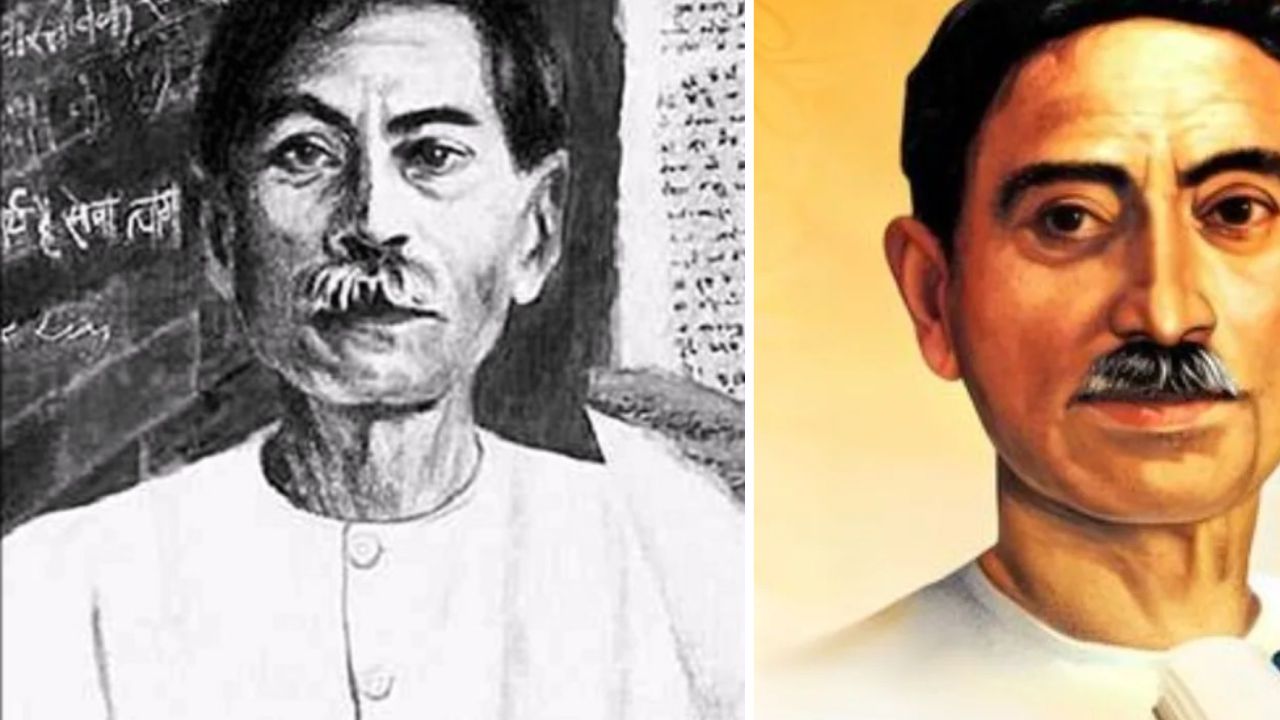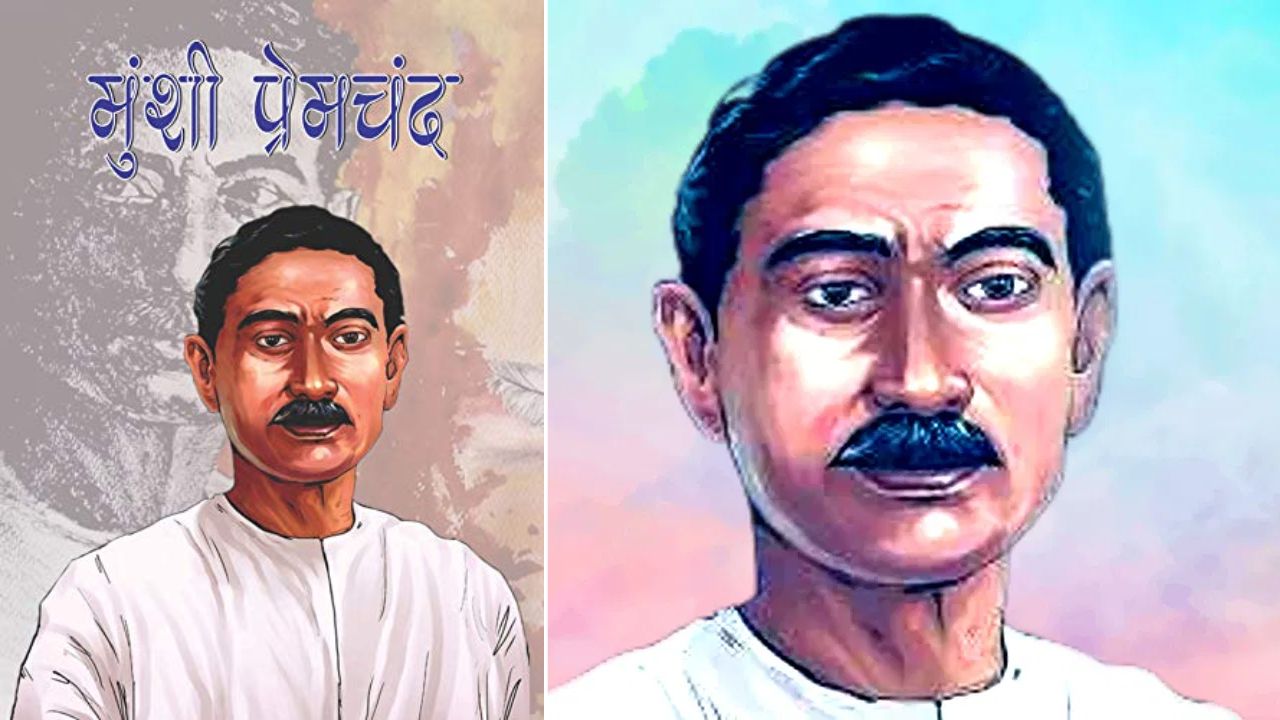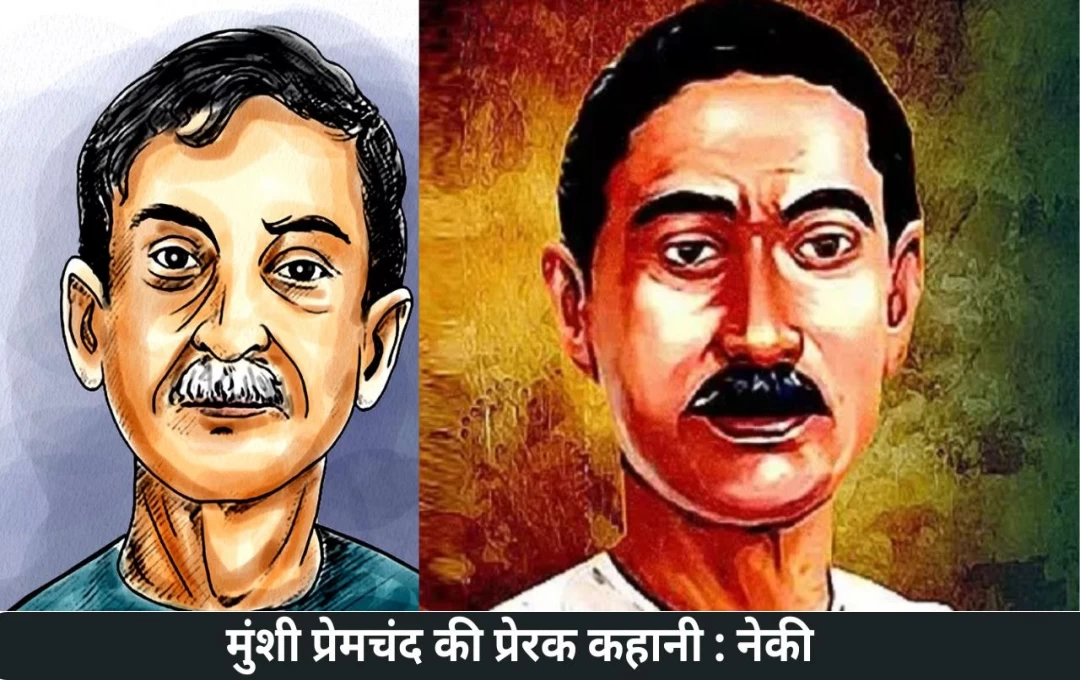Friends, our country has for centuries been the birthplace and home of numerous great personalities brimming with virtues – sages, poets, writers, musicians, and many more. Thousands of works created by these luminaries are invaluable. Today's youth, in this digital age, seem to be losing touch with their heritage and these precious treasures, drifting further and further away. subkuz.com continuously strives to bridge this gap, bringing you these invaluable treasures alongside entertaining stories, news, and information from India and around the world. Presented here is one such invaluable and inspiring story by Munshi Premchand.
Kindness
It was the month of Sawan (July-August). Revati Rani had henna applied to her feet, adorned her hair, and then her elderly mother-in-law said, "Ammaji, I'll go see the fair today."
Revati was the wife of Pandit Chintamani. Panditji, seeing little benefit in worshipping Saraswati, had started worshipping Lakshmi Devi. He engaged in lending and borrowing but, unlike other moneylenders, did not consider it appropriate to charge more than twenty-five percent interest except under special circumstances.
Revati's mother-in-law, holding her grandchild, sat on a palanquin. Hearing her daughter-in-law's words, she said, "You'll get wet, and the baby will catch a cold."
Revati – "No, Amma, it won't take long; I'll be back soon."
Revati had two children – a boy and a girl. The girl was still an infant, and the boy, Hiraman, was seven years old. Revati dressed him in fine clothes. To ward off the evil eye, she applied kohl tilak to his forehead and cheeks, gave him a nice colorful stick for playing with dolls, and went to see the fair with her friends.
A large gathering of women had assembled on the banks of the Keert Sagar lake. Dark clouds loomed overhead. Adorned in finery, the women were enjoying the Sawan's drizzling rain in the open, lush green expanse of the lake. Swings hung from the branches of trees. Some swung on the swings, some sang Malhar songs, and some sat by the lake playing with the waves. The cool, pleasant, gentle spray of water, the vibrant greenery of the hills, and the alluring ripples of the waves created an atmosphere that defied restraint.
Today was the day the dolls were sent off. The dolls were going to their in-laws' houses. Young girls, with henna on their hands and feet, had come to bid farewell to the dolls, adorning them with jewelry and clothes. They floated the dolls in the water and sang the rhythmic songs of Sawan. But as soon as these pampered dolls emerged from the lap of comfort, they were showered with sticks and rods from all sides.
Revati was watching this spectacle, while Hiraman was busy playing with the dolls along with other girls on the steps of the lake. The steps were mossy; his foot slipped, and he fell into the water. Revati screamed and ran, beating her head in despair. In no time, a crowd of men and women gathered, but nobody felt the urge to save the child's life. Their well-groomed hair shouldn't get disheveled! Their washed dhotis shouldn't get wet! Many men harbored these thoughts. Ten minutes passed, but no one dared to jump in. Poor Revati was distraught when suddenly a man on horseback rode past.
Seeing the crowd, he dismounted and asked a bystander, "What's all this commotion?" The bystander replied, "A boy has drowned."
Traveler – "Where?"
Bystander – "Where that woman is standing and weeping."
The traveler immediately took off his heavy Mirzai coat, tightened his dhoti, and jumped into the water. Silence fell over the crowd. People were astonished by this man. His first dive yielded the boy's cap; his second dive, his stick. On his third dive, he surfaced with the boy in his arms. The onlookers raised a loud cheer. The mother rushed and embraced her child. Meanwhile, Pandit Chintamani and several of his friends arrived and began to revive the boy. Within half an hour, the boy opened his eyes. Relief swept through the crowd. The doctor said, "If the boy had remained in the water for two more minutes, it would have been impossible to save him." But when people tried to find their anonymous benefactor, there was no trace of him. They searched everywhere, combing through the entire fair, but he was nowhere to be found.
Twenty years passed. Pandit Chintamani's business flourished. During this time, his mother performed seven pilgrimages before passing away; a grand memorial was built in Thakurdwara. Revati became a mother-in-law to her daughter-in-law. The accounts and ledgers were now handled by Hiraman, who had grown into a b, tall, and kind young man. He often secretly lent money to poor tenants. Chintamani had scolded him many times for this "crime," even threatening to disown him. Once, Hiraman donated fifty rupees to a Sanskrit school. Panditji was so enraged that he didn't eat for two days. Such unpleasant incidents occurred frequently, causing a rift between Hiraman and his father. But all of Hiraman's "misdeeds" were orchestrated by Revati. When the poor widows of the town or the women of tenants harassed by the landlord came to Revati seeking blessings from Hiraman, she felt that there was no one more fortunate than her and no one kinder than her son. Then, she would invariably remember the day Hiraman had nearly drowned in the Keert Sagar lake, and the image of the man who had saved her son would flash before her eyes. A prayer would well up from the depths of her heart, and she would wish that she could see him and fall at his feet. She was now firmly convinced that he was not a human but a deity. She now sat on the same palanquin her mother-in-law used to sit on, feeding both her grandsons.
Today was Hiraman's twenty-seventh birthday. For Revati, this was the most auspicious day of the year. On this day, her charitable hand showed great generosity, an extravagant expense in which even Pandit Chintamani participated. On this day, she would be immensely happy and cry profusely; and the prayers that arose from her heart for her anonymous benefactor were imbued with the best emotions of her heart and mind. It is because of that day that I am fortunate to see this day and this happiness!
One day, Hiraman came to Revati and said, "Amma, Shripur is up for auction; shall I bid?"
Revati – "Is it a good deal?"
Hiraman – "It's a good village. Not too big, not too small. It's ten kos from here. The bidding has already reached twenty thousand. It'll probably end around a hundred or two hundred more."
Revati – "Ask your grandfather."
Hiraman – "Who has the time to haggle with him for two hours?"
Hiraman had become the master of the house, and Chintamani had little say. He, now frail, would spend his time coughing on a mattress, wearing spectacles.
The next day, Shripur was acquired in Hiraman's name. The moneylender had become a landlord; he went to inspect the village with his clerk and two peons. The people of Shripur received news of his arrival. Preparations for presenting gifts were underway, it being the new landlord's first visit. In the late evening, Hiraman entered the village. He was given a tilak of yogurt and rice, and three hundred tenants stood with folded hands in his service until midnight. In the morning, the Mukhtar (representative) began introducing the tenants. Each tenant, as he appeared before the landlord, placed one or two rupees at his feet according to his means. By noon, a pile of five hundred rupees had accumulated.
Hiraman experienced the thrill of being a landlord for the first time, the intoxication of wealth and power. The intoxication of wealth is ber and more dangerous than any other. When the list of tenants was exhausted, he asked the Mukhtar, "Is there any other tenant left?"
Mukhtar – "Yes, Maharaj, there is one more tenant, Takht Singh."
Hiraman – "Why didn't he come?"
Mukhtar – "He is a bit arrogant."
Hiraman – "I will humble him. Someone bring him here."
After a while, an old man came, leaning on a stick, and sat on the ground with folded hands, showing neither respect nor deference. Seeing this insolence, Hiraman's anger flared. He snapped, "You haven't yet dealt with a landlord. I'll teach you a lesson!"
Takht Singh looked intently at Hiraman and replied, "Twenty landlords have come and gone before me, but none have ever spoken to me like this."
Saying this, he picked up his stick and went home.
The old Thakurani (landlord's wife) asked, "Did you see the landlord? What kind of man is he?"
Takht Singh – "He is a good man. I recognized him."
Thakurani – "Did you meet him before?"
Takht Singh – "I've known him for twenty years. Remember the incident at the doll festival?"
From that day on, Takht Singh never went near Hiraman again.

Six months later, Revati also felt the urge to see Shripur. She, her daughter-in-law, and children all went to Shripur. All the women of the village came to meet her. Among them was the old Thakurani. Revati was amazed by her conversation, manners, and refinement. As she was leaving, Revati said, "Thakurani, please visit us sometimes; I felt very happy meeting you."
Thus, a gradual bond developed between the two women. Meanwhile, Hiraman, instigated by his Mukhtar, was devising ways to evict Takht Singh.
The full moon of Jeth (May-June) arrived. Preparations for Hiraman's birthday began. Revati was sifting flour when the old Thakurani arrived. Revati smiled and said, "Thakurani, you are invited to our place tomorrow."
Thakurani – "Your invitation is accepted. What anniversary is it?"
Revati – "His twenty-ninth."
Thakurani – "May Narayan grant you many such days."
Revati – "Thakurani, your words are auspicious. We have done many things, but it is due to your blessings that we see this day. He was only seven years old when his life was in danger. I had gone to see the doll fair when he fell into the water. Then a great soul saved his life. We searched for him, but we couldn't find him. Every year on his birthday, I set aside a hundred rupees in his name. It has now become over two thousand. My son intends to build a temple in Shripur in his name. Believe me, Thakurani, if I could only see him once, my life would be complete, my heart’s desire fulfilled."
When Revati fell silent, tears streamed down the Thakurani's eyes.
The next day, on one side was Hiraman's birthday celebration, and on the other, Takht Singh's land was being auctioned.
Thakurani said, "I'll go to Revati Rani and plead with her."
Takht Singh replied, "Not while I'm alive."
The month of Asadh (June-July) arrived. Meghraj (the rain god) showed his life-giving generosity. The farmers of Shripur went to plow their fields. Takht Singh's longing eyes followed them, even as the earth seemed to hide them in her bosom.
Takht Singh had a cow. He spent his days grazing her. This was his only support. He made ends meet by selling cow dung cakes and milk. Sometimes, he went hungry. He endured all these hardships, but he never went to Hiraman to complain about his poverty. Hiraman had wanted to humiliate him, but he ended up humiliating himself; even in victory, he was defeated. He couldn't subdue the old man with his stubbornness.
One day, Revati said, "Son, you harassed the poor man; that wasn't right."
Hiraman retorted sharply, "He isn't poor. I will break his arrogance."
Intoxicated by wealth, the arrogant landlord was trying to break something that didn't exist; like a foolish child fighting his own shadow.
Takht Singh somehow managed to survive the year. Then came the rains. His house was not well-built. After days of torrential rain, a part of the house collapsed. The cow was tied there and was crushed to death; Takht Singh was also seriously injured. From that day on, he developed a fever. Who would give him medicine? His livelihood was gone. Cruel misfortune had crushed him. His entire house was flooded; there was not a single grain of food in the house; he lay in the dark, groaning, when Revati went to his house. Takht Singh opened his eyes and asked, "Who is it?"
Thakurani – "Revati Rani."
Takht Singh – "My blessings be upon you. You have shown me great kindness."
Revati said, ashamed, "Thakurani, God knows, I'm ashamed of my son. Tell me whatever trouble you are in. Such a calamity has befallen you, and we didn't even know?"
Saying this, Revati placed a small pouch of money before the Thakurani.
Hearing the clinking of the money, Takht Singh sat up and said, "Rani, we are not hungry for this. Don't make me a sinner in my dying moments."
The next day, Hiraman also went there with his companions. He smiled upon seeing the collapsed house. His heart said, "Finally, I broke his arrogance." He went inside the house and said, "Thakur, how are you now?"
The Thakur softly said, "It's all God's grace. How could you forget?"
Hiraman was defeated a second time. His desire that Takht Singh would come to his feet...
The old Thakurani was now alone in the world. No one shared her sorrows, and no one would shed tears at her death. Poverty had intensified her grief. Necessities may not heal the wounds of death but certainly serve as balm.
The worry of food is a terrible affliction. The Thakurani now collected cow dung from fields and pastures, made cakes, and sold them. It was heartbreaking to see her, leaning on a stick, going to the fields and returning, burdened with a basket of dung cakes, gasping for breath. Even Hiraman felt pity for her. One day, he sent flour, lentils, and rice in trays. Revati took them herself. But the old Thakurani, with tears in her eyes, said, "Revati, as long as I can see and move, don't make me and the dying person a sinner."
From that day on, Hiraman didn't dare to show her more sympathy.
One day, Revati bought dung cakes from the Thakurani. In the village, thirty cakes sold for the price she offered for twenty. From that day on, the Thakurani stopped bringing cakes to her house.
How many such women are there in the world! Didn't she know that by revealing the secret, she could end her suffering? But then it would not be a selfless act! The saying goes, "Do good and throw it in the river." Perhaps it never occurred to her that she had done a favor on Revati.

This dignified woman, who valued her honor, survived for three years after her husband's death. Recalling the hardships she endured during that time sends shivers down one's spine. She often went without food for many days. Sometimes she couldn't find cow dung; sometimes someone would steal her cakes. God's will! Some have full houses but no one to eat with them; others spend their lives weeping.
The old woman endured all this suffering but never begged anyone.
Hiraman's thirtieth birthday arrived. The melodious sound of drums was heard. On one side, ghee poories (fried bread) were being cooked, and on the other, oil poories. Ghee poories for the wealthy Brahmins, oil poories for the poor, hungry, and lowly.
Suddenly, a woman came to Revati and said, "Thakurani is very ill. She's calling for you."
Revati thought, "Let's get through this peacefully; the old woman might be dying."
Thinking this, she didn't go to the old woman. When Hiraman saw that his mother didn't want to go, he went himself. This merciful, kind, and noble Revati was.
When Hiraman reached the Thakurani's house, there was complete silence. The old woman's face was pale, and the shadow of death was upon her. Hiraman said softly, "Thakurani, it's me, Hiraman."
The Thakurani opened her eyes and gestured for him to bring his ear closer. Then, pausing, she said, "In the box by my pillow, are Thakur's bones and my bridal vermilion. Send both to Prayagraj."
Saying this, she closed her eyes. Hiraman opened the box; both items were kept safely. He also found ten rupees in a pouch. Perhaps it was the deceased's travel expenses!
That night, the Thakurani's suffering ended forever.
That same night, Revati had a dream – it was the Sawan fair, the clouds were looming, and she was standing by the Keert Sagar lake. Suddenly, Hiraman slipped into the water. She began to cry, beating her chest. Suddenly, an old man jumped into the water and pulled out Hiraman. Revati fell at his feet and said, "Who are you?"
He replied, "I live in Shripur. My name is Takht Singh."
Shripur is still under Hiraman's control, but its charm has changed. From a distance, one can see the golden kalash (pot) of the Shiva temple. Where Takht Singh's house stood, this temple now stands. In front of it is a well and a dharamshala (rest house). Travelers stay there and sing Takht Singh's praises. The temple and dharamshala are both famous in his name.
This was an inspiring story by the great writer Munshi Premchand. We can learn many new things from this story. The entire subkuz team strives to bring you inspiring stories every day. Keep reading such inspiring and informative stories on subkuz.com.







